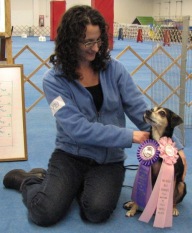I know a superb dog trainer in my area who has a giant breed dog. That wouldn’t be so notable, except she’s an extremely petite woman. The dog outweighs her by quite a bit. But you know what everyone comments on when they see the two of them together? How well the big dog walks on leash. And she does. She really really does. And it’s fantastic to see.
But what nobody ever talks about is the trainer’s attention on the dog. She is always working with her. She’s either using a clicker to reinforce attention and good choices, or by talking to her softly and giving her direction and support (and the occasional treat). The dog thrives on this feedback. You can see her responding and relaxing as she listens to her human. The dog is happy and engaged and her human is too.
I am mentioning this because it is a beautiful demonstration of a relationship based in clear communication. And it is ONGOING. This dog trainer didn’t teach her dog to walk politely for a little while and then stop. Her relationship is constantly developing, adjusting; the trainer responds to her dog in the moment.
Good trainers understand that training isn’t a static, one-time event. It is a continuum, a relationship that will continue as long as your dog lives. Training is a means, not an end. Yes, you can get good solid behaviors, manners, and obedience that are long-lasting, but if you do not continue to reinforce those behaviors, and engage with your dog in a clear, consistent way, the manners and good behavior will fade.
My dog Izzy was a reactive dog. That means that she reacted to seemingly benign things in an over-the-top way. For example, if she walked by a dog who happened to turn his head in her direction, she’d bark and lunge. She was little, but she could make a pretty big scene and it wasn’t pretty.
So every time we went outside together I made sure I could help her handle the things that stressed her out in a way that kept her calm. If I couldn’t, we changed direction or we walked into the street so that the situation would be less difficult for her to handle.
 We did this her whole life. Yes, she got better. We were able to compete in dog sports together (the picture at left is of
We did this her whole life. Yes, she got better. We were able to compete in dog sports together (the picture at left is of
us at a Rally-O trial) and go places where other dogs were out and about, but she was never “cured.” Behavior is not the same thing as an infection. There is no antibiotic for reactivity or aggression. It is up to us–the humans–to give our dogs clear communication and support so they can remain calm enough to understand what they should do in tricky situations. And then it is up to us to let them know when they have done the right thing. Rewards, praise, contact–all those things are motivators for dogs.
Maybe part of the problem here are the words trainer and training. When we say “my dog is trained” or “I have a trained dog,” it implies the dog was trained in the past but now she behaves, a before-and-after kind of thing. But according to Merriam-Webster, the definition of training is “the act, process, or method of one who trains.”
The key word here is process. Body builders get ripped for competition, but if they stop training, the muscles go away. If you want to have a six-pack, you need to train regularly and consistently. The same applies to making sure your dog behaves in a way in which you would like. Training for a little while and then stopping will not reap the benefits you want. Your dog isn’t being lazy or stubborn. Your dog simply is not getting the communication she needs to continue to deal with stressful situations.
So next time your dog does something you aren’t pleased with think about whether you are holding up your end of the conversation. Are you paying attention to your dog, communicating to her, letting her know when she’s being good, and helping her to make the right choices? If you aren’t, don’t worry. Go ahead and start the conversation; it’s never too late. I promise, people will start noticing how well behaved your dog is.
